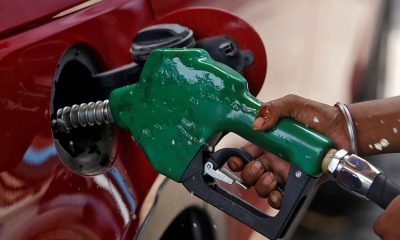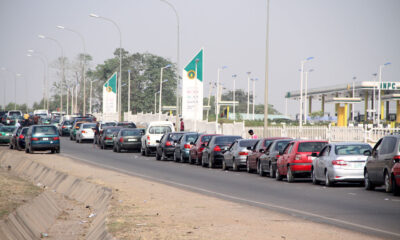Business
NNPC petrol price without subsidy is N400/litre – Marketers

The lowest price the Nigerian National Petroleum Company Limited can sell Premium Motor Spirit, popularly called petrol, to marketers, assuming there is no subsidy, is N400/litre, it has been learnt.
Oil marketers, who made the disclosure on Sunday, also gave other reasons for the continued scarcity of petrol, which had led to the lingering queues at filling stations nationwide.
They said PMS imports charges were becoming unbearable for the sole importer of the commodity – the Nigerian National Petroleum Company Limited, disclosing that the NNPC had been subtly pushing these charges to depot owners.
It was learnt that depot owners, on their part, were also passing the charges to filling stations, which in turn push it to final consumers of the product, a development that has led to the increase in the pump price of the commodity.
It was also gathered that the Federal Government had quietly allowed depot owners to raise the ex-depot price of petrol to about N185/litre, whereas the approved rate used to be N147/litre.
This came as the scarcity for petrol continued on Sunday. Many retail stations in Abuja were shut due to lack of products to sell. Residents had to resort to black marketers, who sold their products in jerry-cans.
READ ALSO:
- Adeleke freezes government accounts, reverses state name
- Breaking! Adeleke Makes First Appointments As Governor of Osun
- Ebonyi INEC office set on fire, PVCs, ballot boxes burnt
The same scenario played out in parts of Nasarawa and Niger states, as oil marketers explained that the rise in the dollar was also contributory to the PMS scarcity witnessed in Nigeria.
“The dollar is affecting PMS purchase, something you were buying for about $15/tonne when the dollar was about N440 to N450, but currently the dollar is about N750 to N800. Definitely the price of the product will increase,” a major marketer, who pleaded not to be named due to lack of authorisation, stated.
The official added, “You can buy a product, say $10/tonne from maybe Russia, it will get to Nigerian waters at that rate, but most of those mother vessels, as soon as they discharge into your own vessel, whatever rate you now pay will be international rates in dollar.
“The mother vessel has its limit, it has to be stationed at Atlas Cove. But the daughter vessel you are going to charge, which brings in the product, will be charged in dollars. They don’t take naira. So all these charges come in dollars.”
The source stated that these charges were currently hitting hard on the NNPC, as the oil company was finding it tough to bear the increased fuel imports’ rates.
“All vessels operate on international rates and it must be in forex. So as it is now, the rates are getting so high for NNPC to bear alone. Some of these charges have to be pushed to depots that are taking the products and they have to pass it on to consumers,” the oil marketer stated.
The source added, “The subsidised ex-depot rate for petrol from NNPC is about N147/litre, but tell me, which depot is selling at that rate today? I know somebody who said he bought from a depot at N182/litre. And he got it at this rate because he did bulk purchase, he bought about 20 trucks.
“And he bought it from one of the major marketing companies. So when you make a bulk purchase at N182/litre, then you can imagine what those who are buying one or two trucks will have to pay for the product.
“This means that there is hardly any depot you can go to now that you can get products for less than N185/litre. And by the time you buy at N185/litre at the depots, why won’t they sell at N200/litre and above?”
This development was confirmed by the National Public Relations Officer of the Independent Petroleum Marketers Association of Nigeria, Chief Ukadike Chinedu, who stated that NNPC was currently finding it tough to continue subsidising PMS.
READ ALSO:
- I reduced debt, left N14bn behind – Oyetola
- How Osun AG avoided gov Oyetola over payment of salaries till last day in office
- Lagos- Ibadan expressway will not become another Abuja-Kaduna Expressway – Gani Adams
“The least that NNPC can sell petrol is over N400/litre to depots and not at N145/litre, but because of subsidy, which is becoming over-bearing on them, the oil firm has been struggling to subsidise,” he stated.
He added, “That is why you see the lapses. The government is looking for dollars to import this product and pay the contractors importing for NNPC, and it is also trying to subsidise PMS.”
Ukadike explained that the landing cost of PMS in Nigeria was about N450/litre, as he noted that subsidy on PMS was no longer sustainable.
“The government will not continue to be Father Christmas and cripple the economy. Subsidy must stop!” he stated.
Agencies keep mum
The Group General Manager, Group Public Affairs Division, NNPC, Garba-Deen Mohammad, did not respond to enquiries when contacted. In fact, the NNPC has remained mute on issues around fuel scarcity.
Similarly, the Nigerian Midstream and Downstream Petroleum Regulatory Authority, the regulator of the downstream oil sector, stayed mute when contacted.
The NMDPRA, just like NNPC, has also remained mute on this matter since last week. The agencies of the Federal Government have decided not to speak on the cost of PMS, amidst the scarcity of the product and attendant queues.
The President, Petroleum Retail Outlet Owners Association of Nigeria, Billy Gillis-Harry, told our correspondent that the crisis in the downstream oil sector would continue until the industry was deregulated.
READ ALSO:
- Lagos- Ibadan expressway will not become another Abuja-Kaduna Expressway – Gani Adams
- Adeleke freezes government accounts, reverses state name
- 2023: Peter Obi Will Fade Away Soon – Omokri
“We have said it times without number that this issue will continue to drag as long as there is subsidy on petrol, which from all indications is no more sustainable. So the best thing is to stop it,” he stated.
Meanwhile, Ukadike also stressed that the continued payment of subsidy on petrol was taking a toll on not just the resources of NNPC but also on the Federal Government.
He said, “It is becoming increasingly difficult for them (NNPC). In fact, it is taking a toll on the economy generally. And even the Federal Government cannot contain it.
“So the best way out is just to allow people to be able to adapt to the non-subsidy regime in order to relax the pressure on the dollar and the government can then invest in other sectors.
“All these issues, including the subsidy regime, contribute to the scarcity we see across the country. The naira is crashing against the dollar, there is less supply of products, NNPC and the government are battling to subsidise petrol, why won’t there be scarcity?”
Subsidy gulps N6.88tn
Last month, The PUNCH exclusively reported that the administration of Nigeria’s President, Major General Muhammadu Buhari (retd.), could spend not less than N10.976tn as subsidy petrol from when it came to power in 2015 till May 2023.
The report showed that already, the government had spent about N6.88tn in subsidising the commodity, according to data obtained from NNPC and the Nigeria Extractive Industries Transparency Initiative.
The President and his party, the All Progressives Congress had, however, kicked against the fuel subsidy scheme that was implemented by the previous administration of the Peoples Democratic Party, while campaigning in 2015.
NEITI had stated in a report submitted in September to the House of Representatives ad-hoc committee investigating the fuel subsidy regime from 2013 to 2022, that petrol was subsidised all through these years.
In October, the Minister of Finance, Budget and National Planning, Zainab Ahmed, told members of the House of Representatives that the Federal Government’s projection was to spend N6.72tn on subsidy in 2023.
She, however, said the second option of the government was to keep fuel subsidy till June 2023 and that in this option, fuel subsidy was projected to gulp N3.3tn.
A combination of all the above figures indicated that the Buhari regime could spend nothing less than N10.976tn on petrol subsidy from 2015 and June 2023.
IPMAN laments scarcity
Meanwhile, the National Controller, Operations, IPMAN, Mike Osatuyi, told The PUNCH on Sunday that its members still lacked the product, adding that few filling stations which had PMS were selling between N230 and N240 per litre.
“We don’t have products because we could not get to buy. There are currently no products at depots”, he said.
According to him, IPMAN currently has over 30, 000 members nationwide, and accounts for 70 per cent ownership of retail outlets in Nigeria.
“Our members are in the villages and outskirts. Go everywhere, you will see our stations”, Osatuyi added.
A Depots Association of Petroleum Products Marketers Association of Nigeria source who pleaded anonymity said its members had paid for products but were not getting any from NNPCL.
“We have people who have paid but were not given. But the NNPC would say it has stock. Where is the stock and why don’t we have products in our tanks?”
The Chairman, IPMAN, Lagos Satellite Depot, Ejigbo, Akin Akinrinade, had said members of the association ought to be getting supply from the Pipelines and Product Marketing Company.
He said members had made payments in excess of N1bn since October 2021.
He however said the products were yet to be delivered, forcing members to patronise private depots for products while at the same time, servicing loans borrowed from banks for their money with PPMC.
PUNCH
Business
Finally, NERC unbundles TCN, creates new system operator

Finally, NERC unbundles TCN, creates new system operator
The Nigerian Electricity Regulatory Commission (NERC) has set up the Nigerian Independent System Operator of Nigeria Limited (NISO) as it unbundles the Transmission Company of Nigeria (TCN).
The transmission leg of the power sector has over the years been seen as weakest link with obsolete equipment.
The unbundling announcement is contained in an Order dated April 30, 2023 and jointly signed by NERC chairman, Sanusi Garba, and vice chairman, Musiliu Oseni.
By this order, the TCN is expected to transfer all market and system operation functions to the new company.
The commission had previously issued transmission service provider (TSP) and system operations (SO) licences to the TCN, in accordance with the Electric Power Sector Reform Act.
The Electricity Act 2023, which came into effect on June 9, provided clearer guidelines for the incorporation and licensing of the independent system operator (ISO), as well as the transfer of assets and liabilities of TCN’s portion of the ISO.
In the circular, the commission ordered the Bureau of Public Enterprises (BPE) to incorporate, unfailingly on May 31, a private company limited by shares under the Companies and Allied Matters Act (CAMA), 2020.
NERC said the company is expected “to carry out the market and system operation functions stipulated in the Electricity Act and the terms and conditions of the system operation licence issued to the TCN.
“The name of the company shall, subject to availability at Corporate Affairs Commission, be the Nigerian Independent System Operator of Nigeria Limited (“NISO”),” NERC said.
Citing the object clause of the NISO’s memorandum of association (MOU) as provided in the Electricity Act, NERC said the company would “hold and manage all assets and liabilities pertaining to market and system operation on behalf of market participants and consumer groups or such stakeholders as the Commission may specify.”
Business
Naira depreciates again, trades at N1,402/$

Naira depreciates again, trades at N1,402/$
The Nigerian currency, naira, on Thursday slightly depreciated at the official market, trading at N1,402.67 to the dollar.
Data from the official trading platform of the FMDQ Exchange, a platform that oversees the Nigerian Autonomous Foreign Exchange Market (NAFEM), showed that the naira lost N11.71
READ ALSO:
- Why I killed my one-year-old son – Delta woman
- Bandits kill nine civilian JTF members, kidnap three in Sokoto
- Yahaya Bello govt spending third term in office through Ododo – Clark
This represents a 0.84 per cent loss when compared to the previous trading date on Tuesday April 30, when it exchanged at 1,390.96 to a dollar.
However, the total daily turnover increased to 232.84 million dollars on Thursday, up from 225.36 million dollars recorded on Tuesday.
Meanwhile, at the Investor’s and Exporter’s (I&E) window, the naira traded between 1,445.00 and N1,299.42 against the dollar.
Naira depreciates again, trades at N1,402/$
Auto
Appeal court takes over NURTW case as NIC withdraws

Appeal court takes over NURTW case as NIC withdraws
The National Industrial Court has withdrawn from a case involving Alhaji Najeem Usman Yasin, Board of Trustees chairman of the National Union of Road Transport Workers (NURTW), and Alhaji Tajudeen Ibikunle Baruwa’s ambition to return as president of the union over lack of jurisdiction.
The industrial court’s decision was made to avoid conflict with the Court of Appeal, where the matter is already being heard.
Before the NIC announced its decision to hands-off the case, the defendants’ counsel, Mr. O.I. Olorundare SAN, had informed the court that the matter is currently before the Court of Appeal, Abuja division, and that the industrial court could not continue to adjudicate on the same matter.
The counsel cited authorities to support his claim, adding that the National Industrial Court does not have concurrent jurisdiction with the Court of Appeal.
The presiding judge, O.O. Oyewunmi, struck out the case, stating that the Appeal Court had taken over the matter and that the Industrial Court must respect the hierarchy of courts.
Alhaji Yasin and six others took the case to the Appeal Court, challenging the decision of the industrial court recognising a delegates’ conference held on May 24, 2023, where Baruwa was proclaimed as President of the union for a second term in office.
With the latest NIC judgement, both parties will now proceed to defend their positions at the Court of Appeal and await the final judgement.
-
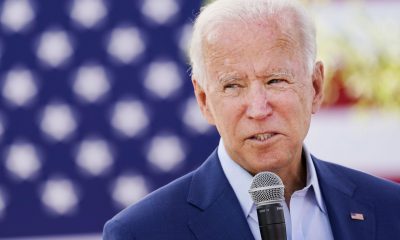
 International3 days ago
International3 days agoUS students slam Biden’s comments on Gaza encampments
-

 Business3 days ago
Business3 days agoNaira depreciates again, trades at N1,402/$
-
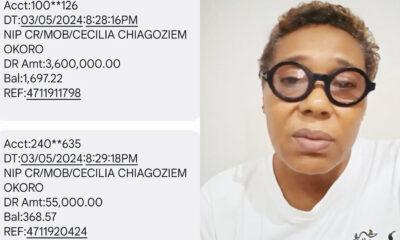
 Entertainment14 hours ago
Entertainment14 hours agoNollywood veteran Shan George weeps as fraudster clears ₦3.6m from her account (VIDEO)
-

 International3 days ago
International3 days agoDam collapses, death toll rises in Brazil floods
-
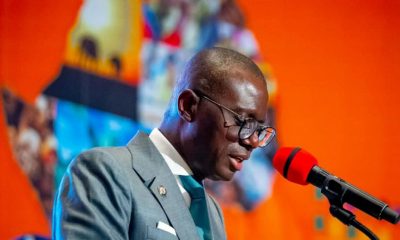
 News3 days ago
News3 days agoLagos GDP hits N41tn, earns N433bn from IGR
-

 News2 days ago
News2 days agoDon’t host US, French military bases in Nigeria, northern leaders warn Tinubu
-

 International15 hours ago
International15 hours agoGaza: Thousands rally for hostage deal as ceasefire talks continue
-

 Sports15 hours ago
Sports15 hours agoRonaldo’s hat-trick leads Al Nassr to 6-0 victory over Al Wehda





